Why include Facebook Ads in a digital marketing strategy?
Facebook has approximately 3.03 billion monthly active users worldwide and at least more than 10 million monthly active advertisers that make life on...
More innovation. More Adsmurai. Explore these features that also make a difference.
Drive your business forward with strategies that work.
Boost your brand’s communication through content strategy.
We make sure every message reaches its audience effectively.
Maximize your digital potential with comprehensive data services.
[Ebook] SEO & SEM: The dual formula for digital success. Discover the two key strategies to boost your search engine visibility.
See moreStay up to date with everything happening at Adsmurai!

Optimizing your ads on Meta is like trying to find the best coffee shop in your city: it can be a challenge, but it's worth it. This will bring "huge benefits" to your brand. Well, at least that's what we've seen.
Know your audience, segment it, tailor your ads to your goals, and engage with your users . Sounds easy, right? As simple as making a shopping list and remembering everything.
And yes, whether you're selling socks or the latest cars, Meta is a platform you should definitely consider for your Paid Media campaigns. Because, after all, where else are you going to find so many people willing to listen to your products while scrolling aimlessly?
In short, if you want to conquer paid media (or at least capture someone's attention for more than 5 seconds), optimize those ads and make your brand shine in Meta. We'll tell you how!
TABLE OF CONTENTS
If you think Facebook Ads are just for wasting money, think again. Including it in your digital marketing strategy can make the difference between having an invisible brand or one that really sells. Here are some key reasons why:
🔹 Massive Reach: With over 3.03 billion active users across Facebook and Instagram, your ads can reach virtually any audience.
🔹 Surgical Targeting: You can choose exactly who you show your ads to based on age, interests, location, behavior, and even whether they've interacted with your brand before.
🔹 Variety of formats: From images and videos to carousels and Reels ads, Facebook Ads gives you options to impact your audience in different ways.
🔹 AI-powered optimization: Meta's algorithm works in your favor to show ads to people most likely to convert.
🔹 Powerful retargeting: Someone visited your website and didn't buy? Give them a boost with personalized ads and bring them back!
🔹 Adjustable costs: You don't need a huge budget to get started. You can optimize with A/B testing and ensure that every peso invested generates results.
Simply put, if you want more traffic, conversions, and brand awareness, Facebook Ads are a must-have for your Paid Media strategy .
Including Facebook in your digital marketing strategy is a safe bet. Despite the great advantages that Meta offers your brand, make sure you follow our step-by-step guide on how to run a Facebook Ads campaign and don't miss our recommendations on how to make your campaigns perform better.
One of the tools you really need to optimise your Facebook campaigns is the A/B test. This technique consists of launching two versions of the same advert and assessing which is the best option according to the results obtained, and Facebook's own platform offers you the option of creating these A/B tests. In addition, they recommend this option to measure possible changes in a campaign or to make a quick comparison of two strategies.
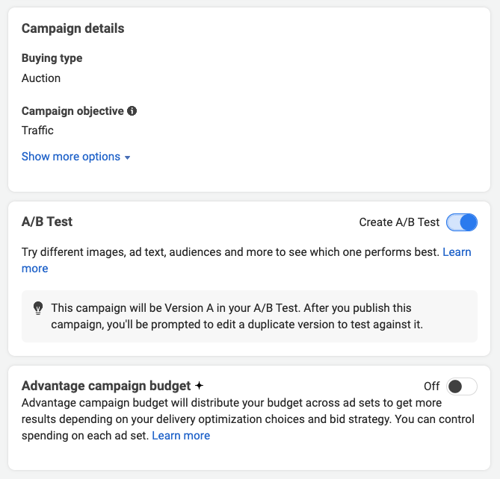
You have multiple options when running A/B tests; choose the one that best suits your goals. You can use this technique on specific ads or a set of ads.
To help you understand this better, here's an example. Imagine you own a watch store and want to optimize your ads. You can test two versions of the same ad:
An essential part of incorporating A/B testing into your Facebook optimizations is analyzing the results. It's very important to wait at least 24 hours after launching a test to analyze the results, giving Facebook's algorithms time to optimize the campaign. Don't rely on the results of a hasty analysis of the results; wait until your campaign has reached at least 500 clicks and 10,000 impressions before drawing conclusions.
Following the example, after a few days, you review which one has the best CTR and conversion to invest more in the winner.
Once you've tested all the elements you're interested in, it's time to apply the results to your strategy. Consider the elements that have performed best and discontinue those with the worst metrics. Redirect your budget to those winning elements and invest in creating new variants.
Let's start at the beginning. Do you know how to run a Facebook Ads campaign? It is important that you know it perfectly, this will help you to know the possibilities offered by the platform and to optimize your ad campaigns in the most effective way.
As we've mentioned, segmenting ads by audience type will help optimize your Facebook Ads campaigns. Users with different interests interact differently with the same content. Therefore, you need to know which interest works best; all you need to do is create a set of ads for each interest.
The more specific your ads are, the more relevant they will be to your users, thus generating more conversions. Once you've identified the different audiences that make up your target audience, you create specific ads based on the characteristics of each one.
That is, depending on a user's interests, they will be grouped into one audience segment or another, which the brand will take into account when creating its ads. This will ensure that users encounter advertising that responds to their needs and is directly tailored to their characteristics. Therefore, it improves the experience for both the user and the advertiser.
Another example, this time you're selling sneakers. Remember! Don't use the same ad for everyone. Instead, target:
How to fine-tune your audience's interests? If you want to better understand the users you want to reach, you can do so with Audience Insights, a tool that will allow you to gather information about your audience so you can tailor your content.
In addition, with Meta Advantage's audience automation solution you can choose between Advantage+ audience, Advantage detailed targeting, Advantage custom audience or Advantage lookalike audiences:
Advantage Audience+: Gives you the opportunity to leverage Meta's artificial intelligence to identify the ideal audience for your campaign. It is considered the simplest and most efficient option in terms of Advantage audience automation.
Advantage Detailed Targeting: Boosts your campaign performance by allowing Meta's system to reach a broader group of people than defined in your detailed targeting selections.
Advantage Custom Audience: Enables Meta systems to deliver ads beyond the initially selected audience, where it is deemed to improve performance.
Advantage lookalike audience: Boosts your campaign performance by allowing the Meta system to target ads to people outside of your defined lookalike audience if it is expected to improve performance.
The different places where Facebook ads can be shown are called "placements," and they have a significant impact on the optimization of your campaigns. The platform offers the option to add placements manually or automatically. The automatic option will help you optimize your posts across all placements.
When you choose this option, the algorithm analyzes which locations are best for your Facebook ads and places them there. Therefore, your ad will be automatically reassigned when the platform detects a more optimal location for your ad. Additionally, using automatic placement will help reduce your costs and use your budget more efficiently.
Log in to the ad manager of your Facebook account.
Choose "targeting" and click "continue".
In the Audiences section you will see that "automatic audiences" is checked by default.
You can delete placements in the "edit placements" box.
Segmenting your audience as much as possible will favour the impact of your ads on them, as well as the final conversions. The objective of targeting is to identify as specifically as possible the characteristics of your target audience.
That is why we have previously talked about audience targeting techniques by interests, but there are also other targeting options. In this case we are talking about targeting by device, this option will allow you to know where, when and on which device your ads will be shown.
The platform offers different options if you want to segment your audience by device. Let's take a look at some of them:
Target devices by location. Once you have selected the type of placement you want for your ad group, you will find the option to choose which devices you want your ad to be shown on. This option allows you to edit in detail the devices on which your ad will appear. (Device type, operating system, brand, model...) You can also exclude certain devices.
Behavioural targeting. It is very common for the same user to own more than one device, which is why this option allows us to know if the user owns a type of device regardless of which one they are using at the time they are viewing the ad.
Device segmentation will help you better define your audience and achieve your goals more effectively. The more you understand your audience, the better you'll be able to tailor the content of your Facebook Ads campaigns.
For example, if you sell a productivity app, create two separate campaigns:
This improves ad relevance and performance.
If you want your ads to reach the audience you want and increase your conversion metrics, don't hesitate to use these three solutions:
The Facebook pixel will allow you to reach those people who are most likely to take the actions you propose in your ads. It also allows you to track the conversion levels of your campaign and facilitate further optimisation.
With the Facebook pixel you can find out, for example, when a user has added a product to the cart, marked a product as a favourite, initiated a payment or made a purchase. In addition, this tool offers the option to track user behaviour and allows you to re-engage with users who are interested in your product but have not completed the purchase process.
On the other hand, it offers the option of reaching more potential customers, as it is the tool itself that allows you to create audiences or similar audiences through the collection of data from the users of your website.
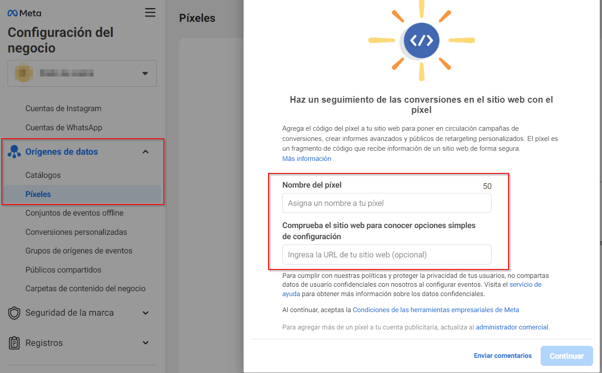

In order to maintain data privacy and still be able to deliver personalised ads to users, Facebook launched Conversions API (CAPI or previously Server-Side API). An interface that allows advertisers to send events from their servers directly to Facebook. These server events are used for measurement, reporting and optimisation. The goal is to send event and conversion data to Facebook Ads Manager while maintaining data privacy.
In addition, Facebook recommends advertisers to implement the Conversions API alongside the Pixel for optimal full-funnel tracking and a much more reliable data exchange. In this way, Facebook's ad optimisation algorithm will be much more effective.
One Tag, available on the Adsmurai Marketing Platform, makes integrating the Conversion API much easier. Forget about complicated coding or technical setup: with an intuitive interface, any advertiser—regardless of their technical expertise—can activate advanced tracking features without any headaches.
In an increasingly challenging digital marketing environment, One Tag becomes a key tool due to its simplicity and effectiveness. It helps implement the conversion API frictionlessly and optimize campaigns across different advertising platforms from a single location.
With increasing pressure to comply with new privacy regulations and the need to adopt solutions like CAPI (Conversion API), staying up to date is more important than ever. One Tag allows you to do this securely, efficiently, and without overspending. In short, it's an accessible and powerful solution for those who want to improve their campaign performance while staying within the rules.

Your Facebook ad creatives can make the difference between being ignored and capturing the attention of your audience. Here are some essential tips for improving the creative in your Facebook ads:c
Don't limit yourself to a single static image. Use:
Having well-designed ads reflects quality and will give users extra confidence in your brand.
That's where Adsmurai Marketing Platform's Creatives comes in , designed specifically to simplify and enhance the creation of large-scale brand creatives. This tool allows users to personalize ads with dynamic elements, apply designs to product sets, and automate adaptation across multiple digital platforms.
Integrated with product feeds, Creatives streamlines the launch of efficient catalog campaigns on Facebook, Instagram, Google, and more, optimizing efforts to create effective ads and inspiring audiences with visually impactful messages aligned with brand objectives.
Wallapop, Unified Ad Design for Different Products
On Wallapop , each user uploads product images in very different ways. For this reason, the brand was looking for a diverse way to showcase the platform's products while maintaining its brand values.
Using Adsmurai Marketing Platform's Creatives, a generic layout was designed for the dynamic ad campaigns. This design had the dual purpose of associating the different products with the Wallapop brand and providing a consistent image for each product category.
The launch of product catalog campaigns combined with dynamic creative improved the performance of Wallapop's ads. The brand achieved a 60% decrease in cost per acquisition and increased ad actions by 90%.
A campaign goes through different phases before it becomes active and it is important that you pay attention to each of them, especially the Learning Phase.
It is the learning phase of the algorithm, when the campaign achieves 50 conversions per ad set, it stabilises. If 7 days pass and the algorithm is still in the Learning Phase, the status will change to Learning Limited, in this phase the costs increase and the conversions decrease.

There are different factors that will help us to control the learning phase:
Targeting. Larger audiences are more likely to convert enough to get a set of ads out of the Learning Phase faster. For this reason, Facebook recommends maximising the audience we have the broader the better. This can be achieved by expanding geolocation, genders, ages, retargeting windows, broader LAL groups, etc.
Liquidity. The more complex the campaign structure, the more difficult it is for the algorithm to interpret. It is recommended to reduce the number of ads and ad sets to the bare essentials. One way to achieve greater liquidity is to use automated placements, which will reduce the number of ad sets and the complexity of campaign placement.
Budget. If you set the budget too high or too low, the system will not correctly determine who to optimise for. You should set a budget sufficient to get a minimum of 50 conversions in total as quickly as possible and avoid changing it frequently, as this can push the ad set into the learning phase.
Optimisations. If a conversion event occurs less than 50 times in a week, your ad set may need to be optimised with a more frequently occurring event. Avoid making unnecessary changes that put your ad groups back into the learning phase.
The Learning Phase is necessary to optimize ads and create new strategies for your campaigns, so don't skip it.
Follow these tips on how to optimize Facebook ads, increase ad conversions and reduce campaign costs. In addition, it will help you stand out from the competition and achieve success as was the case with Sufi.
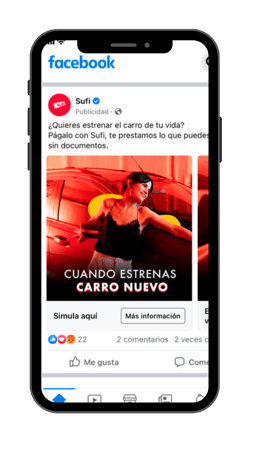
Sufi is one of the brands created by the Bancolombia Group and focused on the sale of auto, consumer, health and education loans. With a correct strategy in Facebook Ads based on dynamic ads in image format, carrousel and Stories optimizing the segmentation of its audience, it managed to increase by 76% the conversions of its ads and reduce by 48% the cost of the forms that appeared in them.
It's important to measure and analyze the results of your Facebook Ads campaigns to identify what's working and what's not. Use Facebook Ads analytics tools to gain insight into your campaigns' performance and make any necessary adjustments to optimize them.
Facebook remains an important platform for launching your paid media campaigns. These tips and best practices for optimizing your Facebook Ads campaigns will help you maximize the effectiveness of your campaigns and achieve your desired goals.
Facebook has over 2.7 billion monthly active users, so you're likely to meet your potential customers on this platform. However, as Facebook grows, so does the competition among brands for its attention.
Keep in mind that Facebook's algorithm treats visual content favorably, and users are also more likely to share it. Remember that video content has greater organic reach. Try to make it valuable without audio, as most videos are activated silently, and it's the user's choice whether to activate them or not.
Facebook remains an important platform for launching your paid media campaigns. These tips and best practices for optimizing your Facebook Ads campaigns will help you maximize the effectiveness of your campaigns and achieve your desired goals.
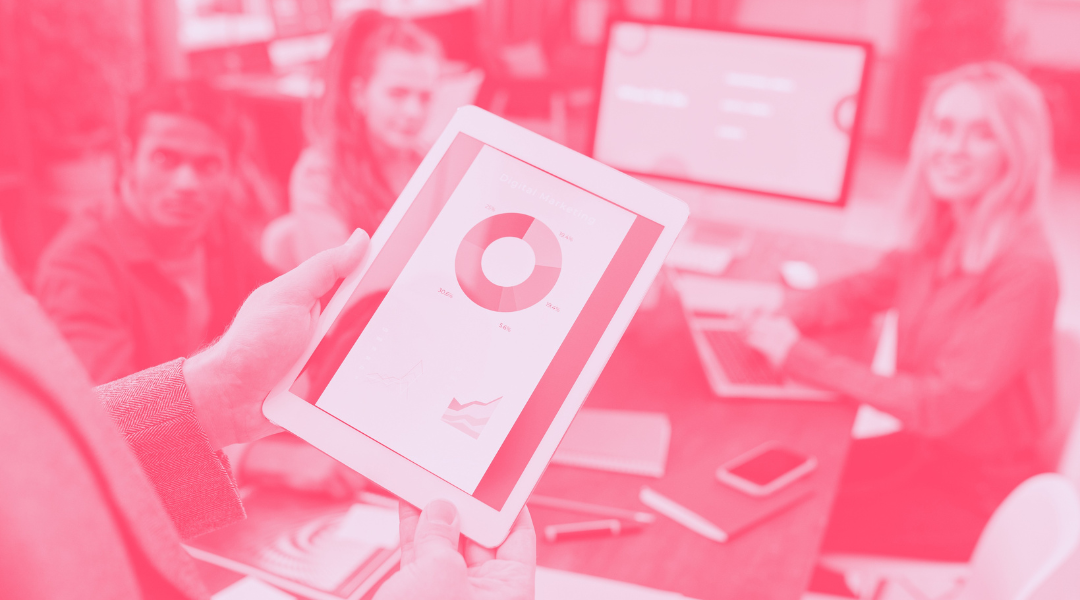
Facebook has approximately 3.03 billion monthly active users worldwide and at least more than 10 million monthly active advertisers that make life on...
![[Guide] How to create a Facebook Ads campaign step-by-step](https://www.adsmurai.com/hubfs/Gu%C3%ADa%20Facebook%20%20%281%29.jpg)
In a digital world where competition for user attention is ever increasing, Facebook Ads has become a key tool for businesses and entrepreneurs...
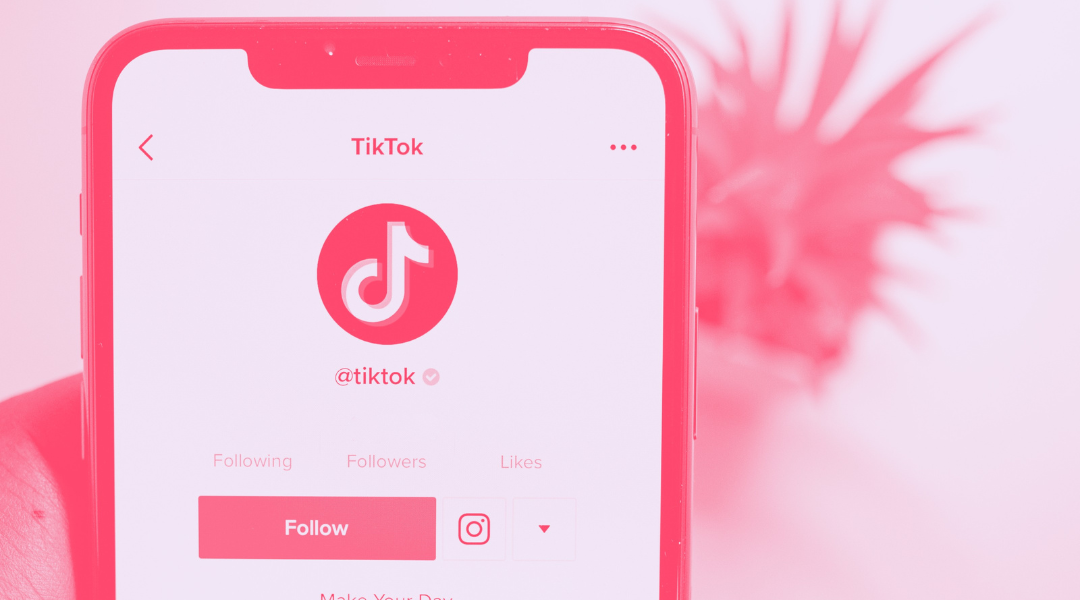
TikTok is one of the world’s most downloaded apps in the last few years. More than a long distance race, the TikTok trajectory can be understood as a